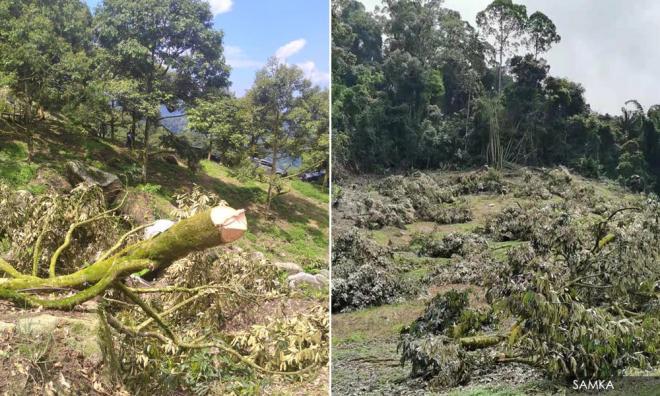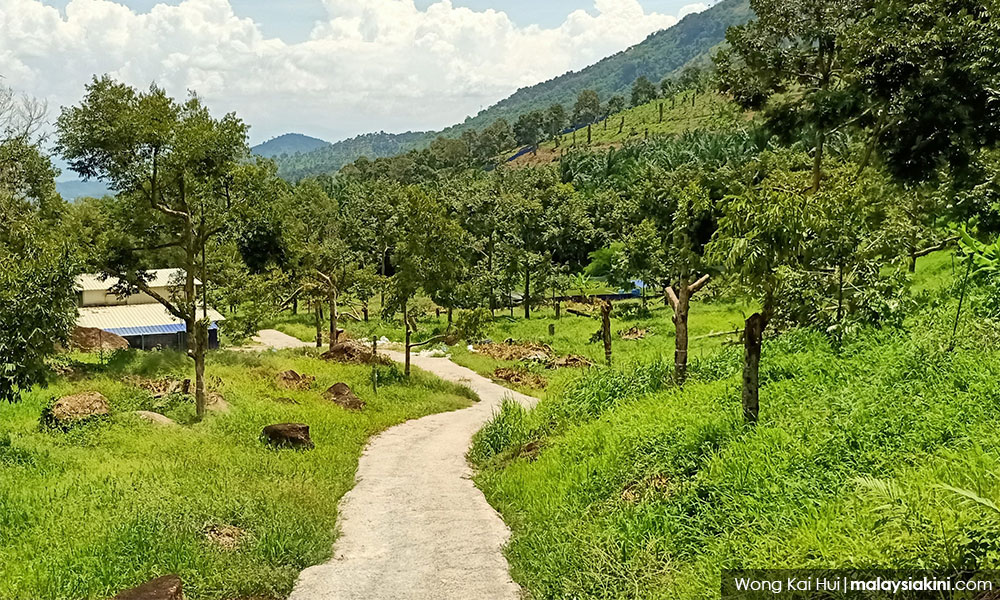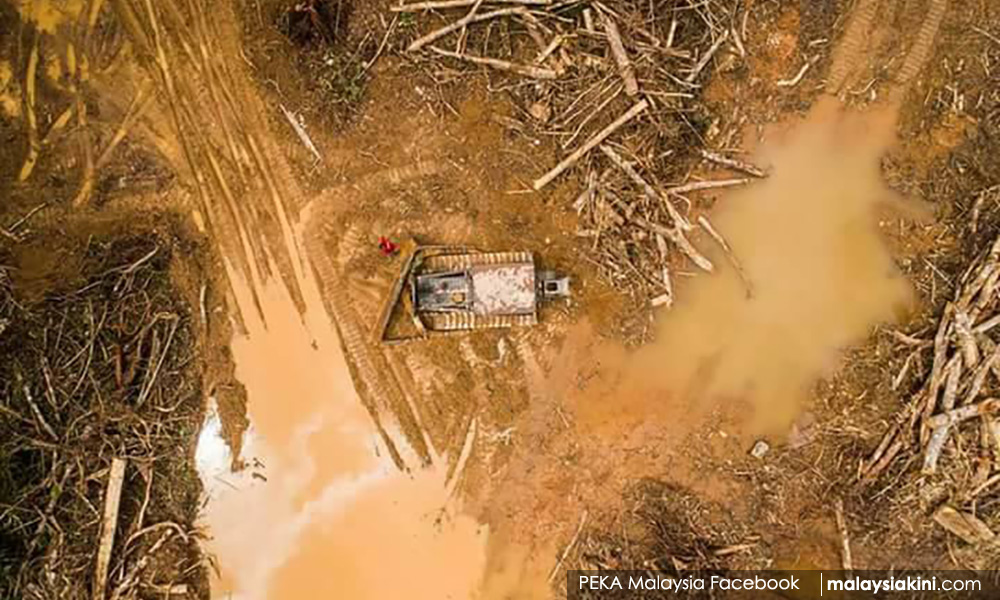
Durians, dengki-ke and double standards
by Mariam Mokhtar
COMMENT | By destroying 15,000 mature durian trees, the Pahang menteri besar, the Land Office and the Forestry Department (and some of you may wish to include the royals), have demonstrated the unequal rights of those in power and those who are not.
The ugly sight of the cleared slopes alongside hills covered in virgin jungle is like a suppurating sore and a suitable metaphor for the ugly stain in the Malaysian psyche.
The rank hypocrisy of the Pahang state government stinks like an open cess pit, infested with maggots, but sadly, it is the story of Malaysia, and the little man standing up against the big man.
Did no one in the state government have the foresight to warn about mudslides if hill slopes are left bare? Where are the graduates in land management or pollution control? Roots of trees hold the soil together, and leaves hold moisture after a rainfall. Now that the trees have been cut, the water run-off from heavy rain will cause massive floods. We should blame the state for causing floods in any Taman Perumahan (residential area) or its vicinity.
It is no coincidence that the destruction of the trees happened after a two-year standoff between the durian farmers of Raub and the joint venture company of the Royal Pahang Durian Resources (RPDR) and the state government (PKPP).
The farmers refuse to be strong-armed into a lopsided agreement, favouring the RPDR-PKPP. Why should they? Why should the RPDR-PKPP breeze in and dictate terms and profit from other people's hard work?
Powerful message
Notice how the destruction of trees did not occur on the land under dispute. Was this a coincidence? No. It wasn't.
The destruction probably serves one purpose - to instil fear.
First. Cutting the trees was meant to send a powerful message to the farmers who have refused to agree to the RPDR-PKPP's terms. It was to say, "We have the power to destroy your livelihood. Sign up or else..."
Second. It was a warning to other farmers who are not privy to the RPDR-PKPP agreement, but who nevertheless encroach onto state land. The message was, "Don't mess with us. Don't forget who's the boss."

No one farms on state land for over 30 years without the knowledge of the Land Office or the Forestry Department. This is another clue that the destruction of trees was deliberate.
Most of these farmers do what they know best. Tending crops. They are good at what they do. They may not have a degree but they provide most of us with food. They do not depend on welfare aid for a living. They are not dependent on handouts.
Few people are aware that when it first started in the 1970s, Felda was multiracial and 35 percent of the farmers were non-Malay. With the ensuing focus on majority Malays (99 percent) in Felda, non-Malay farmers were left in a bind.
In the 80s, the poor farmers lacked funds to purchase land but were probably told to till the state land, and be productive, rather than let it stand idle. At the same time, they were probably told that they will have no problems getting the deeds to the land, except, we know this is another "Janji Kerajaan". I know many people who have gone through the same soul-destroying experience.
Many Malaysians are not aware that these bully tactics don't just happen in Pahang. Take Perak for instance.
Lenggong tea
In the 1980s, the Perak state government had a joint venture with Tate and Lyle, an English company. A tea plantation and processing plant were established in the hills overlooking Lenggong, where the climate was conducive for growing tea. Lenggong tea was the only tea from Malaysia that was sold in London's Harrods and the locals were very proud of this fact.
The plantation was beautifully managed and provided jobs for the locals. Ladies were transported daily from the outlying kampungs to pick the tea.
Then some bright spark, probably a crony friend of the menteri besar, told the state that he could do a better job. So, after 10 years of successful tea cultivation in Perak, the Perak State Development Board (Perbadanan Kemajuan Negeri Perak, or PKNP) kicked the English firm out and took over.
Within two years, the plantation became bankrupt and was forced to shut because of poor management and pilfered stocks, amongst other things. For over a decade, the land was left idle and the buildings became a drug and alcohol den for locals.
In 2008, Amy Tan and her husband, obtained permission to start a permaculture farm on the site of the former tea plantation. They repaired the damaged buildings and started an organic farm and hands-on teaching centre.
Their site was featured in the National Geographic documentary, produced in 2016 called, "Living Free with Kimi Werner"; but Amy's success prompted the 'dengki-ke' (envy) culture to rear its ugly head again.
In 2019, the PKNP kicked Amy out, claiming she had not paid her rent. The Special Branch was sent to intimidate her. She was eventually evicted. Soon after, the former farm was logged clean of trees and in one part, was planted with a non-native species, the eucalyptus tree. When PAS heard, they complained.
Environmental hypocrisy
Many Malaysians are not aware that the Raub durian farmers, whom many claim are illegal settlers, planted the durian trees only after loggers had left the hillside.
This is another hypocrisy of the state. It claims that 1.5 million hectares of jungle is to be protected but 63 percent of this, around 1 million hectares, can be logged. This is not "protecting" jungle reserves.

The loggers enter the jungle and cut the trees. There is no sustainable logging and then the state wonders why large areas become flooded.
The Raub farmers moved in only after the loggers have left large areas of bare land. The farmers plant rubber, cocoa or durian. They are helping to re-populate the jungle with trees. They did not in the first instance destroy large tracts of land.
When the state wants to hide bad news, it will create some worse news. That is why the cutting of durian trees is a smokescreen and distraction for other environmentally damaging practices.
The Lynas radioactive waste dump is in a jungle reserve, so what sort of protection is the state referring to?
The Orang Asli, the natural guardians/protectors of Tasik Chini, are treated abysmally by the state, but the state does not protect them either.
The cutting of the durian trees has absorbed our attention, but its main purpose was most probably to divert our focus from the exposé about a mining company with royal links, in the environmentally sensitive Tasik Chini.
MARIAM MOKHTAR is a defender of the truth, the admiral-general of the Green Bean Army and president of the Perak Liberation Organisation (PLO). Blog, Twitter.
by Mariam Mokhtar
COMMENT | By destroying 15,000 mature durian trees, the Pahang menteri besar, the Land Office and the Forestry Department (and some of you may wish to include the royals), have demonstrated the unequal rights of those in power and those who are not.
The ugly sight of the cleared slopes alongside hills covered in virgin jungle is like a suppurating sore and a suitable metaphor for the ugly stain in the Malaysian psyche.
The rank hypocrisy of the Pahang state government stinks like an open cess pit, infested with maggots, but sadly, it is the story of Malaysia, and the little man standing up against the big man.
Did no one in the state government have the foresight to warn about mudslides if hill slopes are left bare? Where are the graduates in land management or pollution control? Roots of trees hold the soil together, and leaves hold moisture after a rainfall. Now that the trees have been cut, the water run-off from heavy rain will cause massive floods. We should blame the state for causing floods in any Taman Perumahan (residential area) or its vicinity.
It is no coincidence that the destruction of the trees happened after a two-year standoff between the durian farmers of Raub and the joint venture company of the Royal Pahang Durian Resources (RPDR) and the state government (PKPP).
The farmers refuse to be strong-armed into a lopsided agreement, favouring the RPDR-PKPP. Why should they? Why should the RPDR-PKPP breeze in and dictate terms and profit from other people's hard work?
Powerful message
Notice how the destruction of trees did not occur on the land under dispute. Was this a coincidence? No. It wasn't.
The destruction probably serves one purpose - to instil fear.
First. Cutting the trees was meant to send a powerful message to the farmers who have refused to agree to the RPDR-PKPP's terms. It was to say, "We have the power to destroy your livelihood. Sign up or else..."
Second. It was a warning to other farmers who are not privy to the RPDR-PKPP agreement, but who nevertheless encroach onto state land. The message was, "Don't mess with us. Don't forget who's the boss."

No one farms on state land for over 30 years without the knowledge of the Land Office or the Forestry Department. This is another clue that the destruction of trees was deliberate.
Most of these farmers do what they know best. Tending crops. They are good at what they do. They may not have a degree but they provide most of us with food. They do not depend on welfare aid for a living. They are not dependent on handouts.
Few people are aware that when it first started in the 1970s, Felda was multiracial and 35 percent of the farmers were non-Malay. With the ensuing focus on majority Malays (99 percent) in Felda, non-Malay farmers were left in a bind.
In the 80s, the poor farmers lacked funds to purchase land but were probably told to till the state land, and be productive, rather than let it stand idle. At the same time, they were probably told that they will have no problems getting the deeds to the land, except, we know this is another "Janji Kerajaan". I know many people who have gone through the same soul-destroying experience.
Many Malaysians are not aware that these bully tactics don't just happen in Pahang. Take Perak for instance.
Lenggong tea
In the 1980s, the Perak state government had a joint venture with Tate and Lyle, an English company. A tea plantation and processing plant were established in the hills overlooking Lenggong, where the climate was conducive for growing tea. Lenggong tea was the only tea from Malaysia that was sold in London's Harrods and the locals were very proud of this fact.
The plantation was beautifully managed and provided jobs for the locals. Ladies were transported daily from the outlying kampungs to pick the tea.
Then some bright spark, probably a crony friend of the menteri besar, told the state that he could do a better job. So, after 10 years of successful tea cultivation in Perak, the Perak State Development Board (Perbadanan Kemajuan Negeri Perak, or PKNP) kicked the English firm out and took over.
Within two years, the plantation became bankrupt and was forced to shut because of poor management and pilfered stocks, amongst other things. For over a decade, the land was left idle and the buildings became a drug and alcohol den for locals.
In 2008, Amy Tan and her husband, obtained permission to start a permaculture farm on the site of the former tea plantation. They repaired the damaged buildings and started an organic farm and hands-on teaching centre.
Their site was featured in the National Geographic documentary, produced in 2016 called, "Living Free with Kimi Werner"; but Amy's success prompted the 'dengki-ke' (envy) culture to rear its ugly head again.
In 2019, the PKNP kicked Amy out, claiming she had not paid her rent. The Special Branch was sent to intimidate her. She was eventually evicted. Soon after, the former farm was logged clean of trees and in one part, was planted with a non-native species, the eucalyptus tree. When PAS heard, they complained.
Environmental hypocrisy
Many Malaysians are not aware that the Raub durian farmers, whom many claim are illegal settlers, planted the durian trees only after loggers had left the hillside.
This is another hypocrisy of the state. It claims that 1.5 million hectares of jungle is to be protected but 63 percent of this, around 1 million hectares, can be logged. This is not "protecting" jungle reserves.

The loggers enter the jungle and cut the trees. There is no sustainable logging and then the state wonders why large areas become flooded.
The Raub farmers moved in only after the loggers have left large areas of bare land. The farmers plant rubber, cocoa or durian. They are helping to re-populate the jungle with trees. They did not in the first instance destroy large tracts of land.
When the state wants to hide bad news, it will create some worse news. That is why the cutting of durian trees is a smokescreen and distraction for other environmentally damaging practices.
The Lynas radioactive waste dump is in a jungle reserve, so what sort of protection is the state referring to?
The Orang Asli, the natural guardians/protectors of Tasik Chini, are treated abysmally by the state, but the state does not protect them either.
The cutting of the durian trees has absorbed our attention, but its main purpose was most probably to divert our focus from the exposé about a mining company with royal links, in the environmentally sensitive Tasik Chini.
MARIAM MOKHTAR is a defender of the truth, the admiral-general of the Green Bean Army and president of the Perak Liberation Organisation (PLO). Blog, Twitter.
I have always admired Mariam for her honesty and courage to call out the powers that be for what she deems to be wrong doings or abuse of power.
ReplyDeleteI hope there will be more who will bravely stand with her.
Unfortunately, royalty is party to this episode and certainly have proven they have contracted the ringgit disease.
Sickening....but what can we do ?
ReplyDeleteKerajaan lama lemah. mereka menganggap orang cina sebagai bank undi yg boleh swing utk memenangi pilihanraya tempatan. Rasuah undi pilihanraya.
ReplyDeleteYg salah tetap salah walau 100 tahun pun